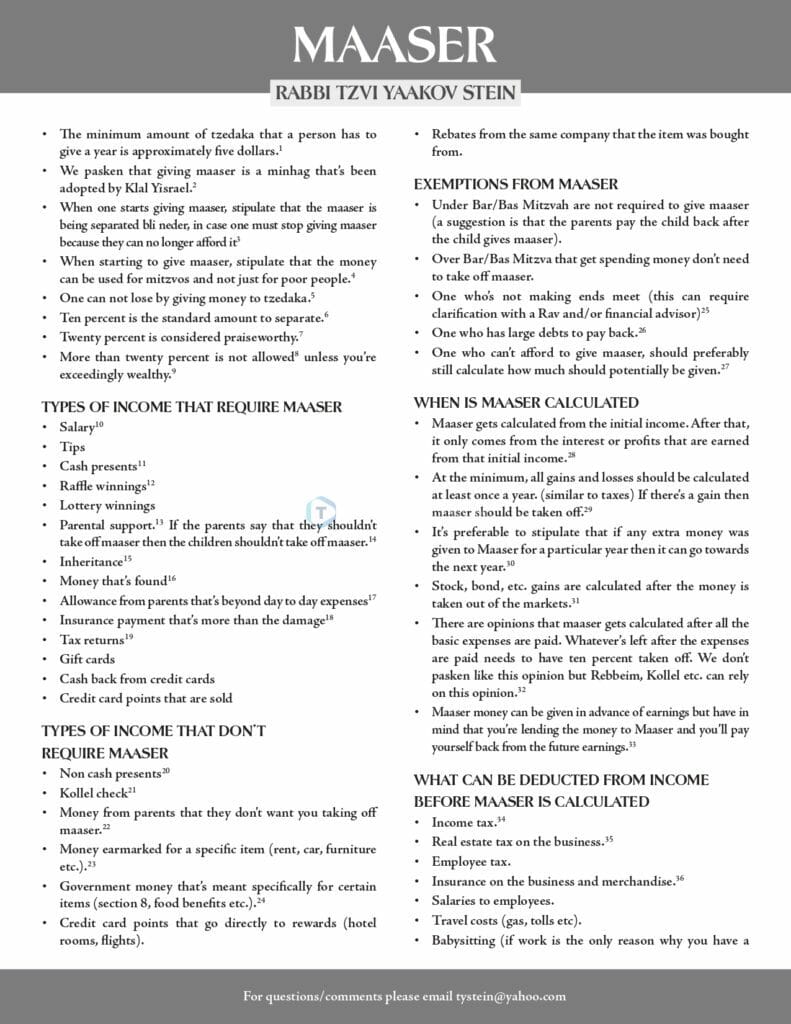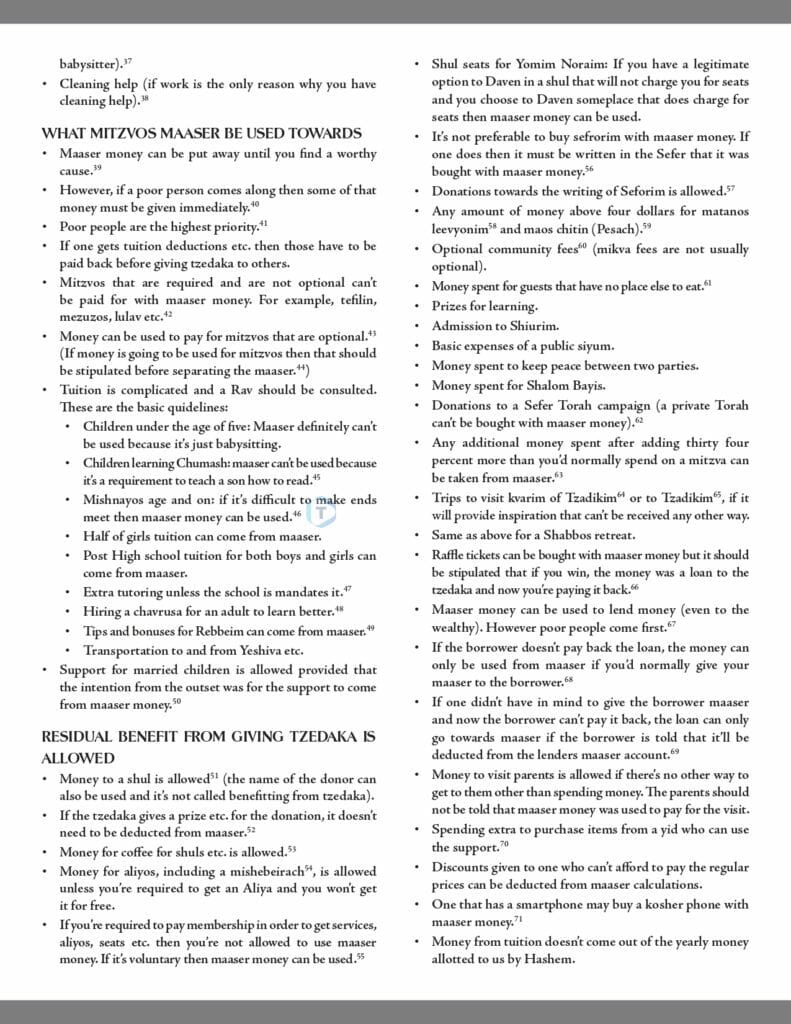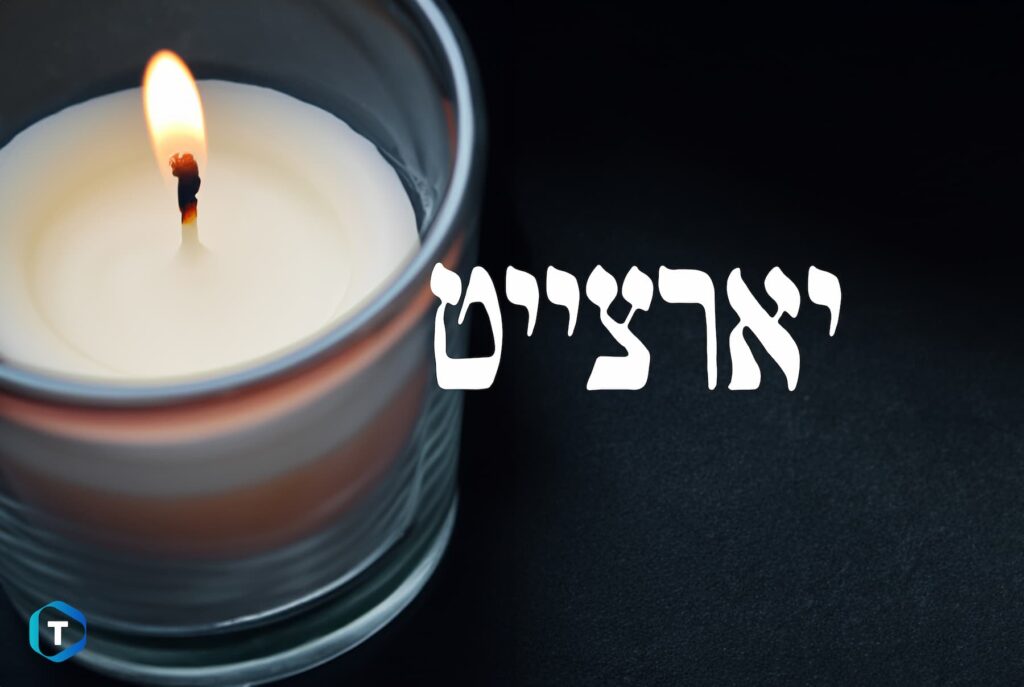Many have the minhag to arrange their Maaser money before Rosh Hashana.
• The minimum amount of tzedaka that a person has to give a year is approximately five dollars.
• We pasken that giving maaser is a minhag that’s been adopted by Klal Yisrael.
• When one starts giving maaser, stipulate that the maaser is being separated bli neder, in case one must stop giving maaser because they can no longer afford it.
• When starting to give maaser, stipulate that the money can be used for mitzvos and not just for poor people.
• One can not lose by giving money to tzedaka.
• Ten percent is the standard amount to separate.
• Twenty percent is considered praiseworthy.
• More than twenty percent is not allowed unless you’re exceedingly wealthy.
TYPES OF INCOME THAT REQUIRE MAASER
• Salary
• Tips
• Cash presents
• Raffle winnings
• Lottery winnings
• Parental support. If the parents say that they shouldn’t take off maaser then the children shouldn’t take off maaser.
• Inheritance
• Money that’s found
• Allowance from parents that’s beyond day to day expenses
• Insurance payment that’s more than the damage
• Tax returns
• Gift cards
• Cash back from credit cards
• Credit card points that are sold
TYPES OF INCOME THAT DON’T REQUIRE MAASER
• Non cash presents
• Kollel check
• Money from parents that they don’t want you taking off maaser.
• Money earmarked for a specific item (rent, car, furniture etc.).
• Government money that’s meant specifically for certain items (section 8, food benefits etc.).
• Credit card points that go directly to rewards (hotel rooms, flights).
• Rebates from the same company that the item was bought
from.
EXEMPTIONS FROM MAASER
• Under Bar/Bas Mitzvah are not required to give maaser (a suggestion is that the parents pay the child back after the child gives maaser).
• Over Bar/Bas Mitzvah that get spending money don’t need to take off maaser.
• One who’s not making ends meet (this can require clarification with a Rav and/or financial advisor).
• One who has large debts to pay back.
• One who can’t afford to give maaser should preferably still calculate how much should potentially be given.
WHEN IS MAASER CALCULATED
• Maaser gets calculated from the initial income. After that, it only comes from the interest or profits that are earned from that initial income.
• At the minimum, all gains and losses should be calculated at least once a year (similar to taxes). If there’s a gain then maaser should be taken off.
• It’s preferable to stipulate that if any extra money was given to maaser for a particular year then it can go towards the next year.
• Stock, bond, and similar gains are calculated after the money is taken out of the markets.
• There are opinions that maaser gets calculated after all the basic expenses are paid. Whatever’s left after the expenses are paid needs to have ten percent taken off. We don’t pasken like this opinion but Rebbeim, Kollel etc. can rely on this opinion.
• Maaser money can be given in advance of earnings but have in mind that you’re lending the money to maaser and you’ll pay yourself back from the future earnings.
WHAT CAN BE DEDUCTED FROM INCOME BEFORE MAASER IS CALCULATED
• Income tax
• Real estate tax on the business
• Employee tax
• Insurance on the business and merchandise
• Salaries to employees
• Travel costs (gas, tolls etc.)
• Babysitting (if work is the only reason why you have a babysitter)
• Cleaning help (if work is the only reason why you have cleaning help)
WHAT MITZVOS MAASER CAN BE USED TOWARDS
• Maaser money can be put away until you find a worthy cause.
• However, if a poor person comes along then some of that money must be given immediately.
• Poor people are the highest priority.
• If one gets tuition deductions etc. then those have to be paid back before giving tzedaka to others.
• Mitzvos that are required and are not optional can’t be paid for with maaser money. For example, tefilin, mezuzos, lulav etc.
• Money can be used to pay for mitzvos that are optional. (If money is going to be used for mitzvos then that should be stipulated before separating the maaser.)
• Tuition is complicated and a Rav should be consulted. These are the basic guidelines:
- Children under the age of five: maaser definitely can’t be used because it’s just babysitting.
- Children learning Chumash: maaser can’t be used because it’s a requirement to teach a son how to read.
- Mishnayos age and on: if it’s difficult to make ends meet then maaser money can be used.
- Half of girls’ tuition can come from maaser.
- Post high school tuition for both boys and girls can come from maaser.
- Extra tutoring unless the school mandates it.
- Hiring a chavrusa for an adult to learn better.
- Tips and bonuses for Rebbeim can come from maaser.
- Transportation to and from Yeshiva etc.
- Support for married children is allowed provided that the intention from the outset was for the support to come from maaser money.
RESIDUAL BENEFIT FROM GIVING TZEDAKA IS ALLOWED
• Money to a shul is allowed (the name of the donor can also be used and it’s not called benefitting from tzedaka).
• If the tzedaka gives a prize etc. for the donation, it doesn’t need to be deducted from maaser.
• Money for coffee for shuls etc. is allowed.
• Money for aliyos, including a mishebeirach, is allowed unless you’re required to get an aliya and you won’t get it for free.
• If you’re required to pay membership in order to get services, aliyos, seats etc. then you’re not allowed to use maaser money. If it’s voluntary then maaser money can be used.
• Shul seats for Yomim Noraim: if you have a legitimate option to daven in a shul that will not charge you for seats and you choose to daven someplace that does charge for seats then maaser money can be used.
• It’s not preferable to buy seforim with maaser money. If one does then it must be written in the sefer that it was bought with maaser money.
• Donations towards the writing of seforim is allowed.
• Any amount of money above four dollars for matanos le’evyonim and maos chitin (Pesach).
• Optional community fees (mikva fees are not usually optional).
• Money spent for guests that have no place else to eat.
• Prizes for learning.
• Admission to shiurim.
• Basic expenses of a public siyum.
• Money spent to keep peace between two parties.
• Money spent for shalom bayis.
• Donations to a Sefer Torah campaign (a private Torah can’t be bought with maaser money).
• Any additional money spent after adding thirty-four percent more than you’d normally spend on a mitzva can be taken from maaser.
• Trips to visit kvarim of Tzadikim or to Tzadikim, if it will provide inspiration that can’t be received any other way.
• Same as above for a Shabbos retreat.
• Raffle tickets can be bought with maaser money but it should be stipulated that if you win, the money was a loan to the tzedaka and now you’re paying it back.
• Maaser money can be used to lend money (even to the wealthy). However poor people come first.
• If the borrower doesn’t pay back the loan, the money can only be used from maaser if you’d normally give your maaser to the borrower.
• If one didn’t have in mind to give the borrower maaser and now the borrower can’t pay it back, the loan can only go towards maaser if the borrower is told that it’ll be deducted from the lender’s maaser account.
• Money to visit parents is allowed if there’s no other way to get to them other than spending money. The parents should not be told that maaser money was used to pay for the visit.
• Spending extra to purchase items from a yid who can use the support.
• Discounts given to one who can’t afford to pay the regular prices can be deducted from maaser calculations.
• One that has a smartphone may buy a kosher phone with maaser money.
• Money from tuition doesn’t come out of the yearly money allotted to us by Hashem.
Download and Share:


For questions/ comments please email [email protected]











